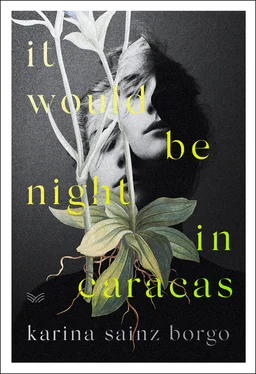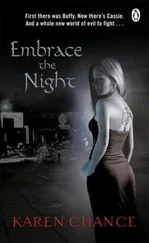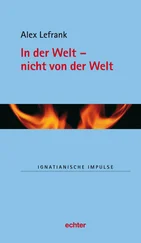I started to ration everything to avoid having to go out and find it. The only thing I needed was silence. I barely opened the windows. The revolutionary forces used tear gas to repress the people who were protesting the rationing decrees, and the fumes impregnated everything, making me vomit until I was pale. I sealed all the windows with duct tape, except the ones in the bathroom and kitchen, which didn’t face the street. I did all I could not to let anything make its way in from outside.
I answered only calls from the publishing house staff, who decided to give me a week’s grace period for my loss. I’d fallen behind with revising a few galley proofs. It was in my interest to invoice for the job, but I felt incapable of doing the work. I needed money but had no way of receiving it. There was no connection for carrying out transfers. The internet worked in fits and bursts. It was slow and patchy. All the bolívares I’d deposited in a savings account had been spent on my mother’s treatment. As for the pay I’d received for my editing work, there wasn’t much left, with an additional problem. By order of the Sons of the Revolution, foreign currency had become illegal. Having any amounted to treason.
When I turned on my phone three messages pinged, all from Ana. One to ask how I was, and two of the kind that get sent by default to a phone’s entire contact list. The message stated that fifteen days had gone by with no news from Santiago and asked us to sign a petition for his freedom. I didn’t respond. I couldn’t do anything for her, and she couldn’t do anything for me. We were condemned, like the rest of the country, to become strangers to ourselves. It was survivor’s guilt, and those who left the country suffered from it too, a mixture of reproach and shame: opting out of suffering was another form of betrayal.
Such was the power of the Sons of the Revolution. They separated us on two sides of a line. Those who have and those who have not. Those who leave and those who stay. Those who can be trusted and those who cannot. Apportioning blame was just one more division that they cleaved through a society already riddled with them. I wasn’t having an easy time of it, but if there was one thing I was sure of, it was that my circumstances could be worse. Being free of death’s stranglehold condemned me to silence out of decency.
IN THE MIDST of that night’s shoot-out, I realized my neighbor’s flush hadn’t sounded. I hadn’t seen Aurora Peralta since my mother went into palliative care. I was surprised to realize I hadn’t heard the irritating pull of the chain, which night after night sounded through my bedroom wall, interrupting my dreams with its gurgle of wastewater.
I knew very little about Aurora. Only that she was timid and dowdy, and that everyone called her “the Spanish woman’s daughter.” Her mother, Julia, was a Galician who ran a small eatery in La Candelaria, the area in Caracas with the largest concentration of bars run by Spanish immigrants. They were frequented by immigrants from Galicia and the Canary Islands, and by the odd Italian.
Almost all the customers were men. They went there to drink bottles of beer, which they sipped unenthusiastically. Even in the hellish heat, they pecked at chickpea-and-spinach stew, lentils with chorizo, or tripe and rice. Casa Peralta was known as the best place in the city to eat mussel-and-white-bean stew. Judging by the number of diners, that was a fair assessment.
Julia, the owner, had been one of the many Spanish women who made a living from the trades they plied before coming to Venezuela: cooking, dressmaking, farming, waitressing, nursing. Yet, most started out working as housekeepers for the local bourgeoisie in the fifties and sixties; others opened small stores and other businesses. They had only one thing to live by: their hands. Spanish printers, booksellers, and some teachers came to the city too and became part of our lives, bringing with them those resounding, lisped z ’s that cut through the air in any conversation until they made our pronunciation their own.
Aurora Peralta, like her mother, made a living by cooking for others. For quite some time both before and after Julia’s death, she ran the family restaurant. Then she sold it to start up a pastry-making business that she ran from home. Renting premises was expensive, and it was risky: anyone could stage a holdup and take everything she had, not to mention shoot the unfortunate person who at that moment had access to the cash register.
Only nine years separated us, but she already seemed like an old lady. She came over a few times with a cake just out of the oven. Like her mother when she was alive, she seemed affable and generous. And one thing in her life resembled my own: she had no father. Or at least that was the conclusion I came to when I noticed that the life she and her mother led looked a lot like ours. They started and ended each day together, as mother and daughter. I’d been surprised when she hadn’t come to my mother’s wake. I’d told her in person how poorly my mother was when she’d asked after her health. I assumed the shortages of flour, eggs, and sugar had put a strain on her business, that she was going through a tough time, or had returned to Spain, if she still had family there. Then I forgot about her as easily as I forgot about a faulty lightbulb. I was too busy completing a second gestation, nourished only by my mother, whose presence I could still feel around me. I didn’t need or want anything else. No one would take care of me, and I wouldn’t take care of anyone. If things got worse, I would earn my right to live by walking all over the rights of others. It was them or me. There was no one alive in that country who was generous enough to give me a coup de grâce. No one would blindfold me or put a cigarette in my mouth. No one would pity me when my time came.
MY MOTHER’S BELONGINGS were, finally, in boxes to one side of the home library. They looked like baggage that time had packed behind our backs. I resisted the urge to give away or donate all of it. I didn’t intend to leave a single page, length of fabric, or splinter of wood to this doomed country going up in flames.
The days accumulated like the dead in the headlines. The Sons of the Revolution tightened the screws. They gave us reason to go out in the street, and all the while the state-sponsored bodies and armed cells repressed those who did, acting in groups with their faces covered, cleansing the pavements. No one was completely safe in their homes. Outside, in the jungle, methods to neutralize opponents reached an unprecedented degree of finesse. Across the nation the only thing in working order was the killing and stealing machine, the pillaging apparatus. I watched them grow and become part of the cityscape, just another feature of everyday life: a presence camouflaged in the disorder and chaos, protected and nourished by the Revolution.
Almost all the militias were made up of civilians. They acted under police protection. They started congregating by the trash heap at Plaza del Comandante, which we were still calling by its original name: Plaza Miranda, a tribute to the only truly liberal figure of our War of Independence, who died, like other good and just men, far from the country he’d given his all. That was where the Sons of the Revolution chose to establish their new command. Sons? I thought. And why not bastards? “Bastards of the Revolution,” I murmured on seeing a troupe of obese women, all dressed in red. They looked like a family. A gynoecium of roly-poly nymphs: fathers and brothers who were really mothers and sisters. Vestals armed with buckets of water and sticks, femininity in all its splendor and at its most bizarre.
The first day, a convoy of ten soldiers—faceless thanks to dark helmets with skull smiles—camped next to them. After a few weeks, more arrived. All the while more members of the Fatherland’s Motorized Fleet turned up. It was impossible to identify them. They wore the masks used by riot police. The lower half of the face was covered with the smiling jawbone of a skeleton and, at the height of the eyes, a piece of rubber was bored with holes. Why did they take such pains to hide their identity when the law was in their hands?
Читать дальше












